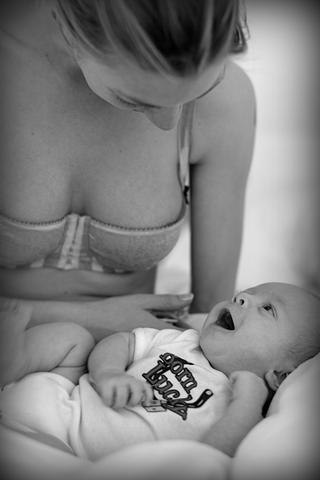What to Expect When You Bring Home a Newborn
It's been nine months - maybe ten - and the big day has finally arrived! Labor has started, you are nervous and excited and cannot wait to meet the tiny human being who has been safely nestled in your womb all this time. You give birth, and if you are in the hospital you cannot wait to get your baby home! If you birth at home, you cannot wait for quietude and bonding time. Regardless of how or where you give birth, there are a few things that may happen once the excitement of labor and birth have passed, and it is important to be aware of them should they arise. Even though they are normal, they may cause challenges for you and it is so important that you take care of yourself and ask for help when you need it. 1. Breastfeeding will cause uterine contractions. Our bodies are so amazing, and every natural occurrence that takes place within are so wonderfully synchronized to assist the body as a whole, even if at times they are a bit unpleasant. Breastfeeding causes the body to release oxytocin and prostaglandin which bring on uterine contractions after giving birth. This is necessary for bringing the uterus back down to its normal size over the course of the first few weeks. The pain of uterine contractions is usually the most intense during the first day or so after giving birth, and can be milder for first time mothers since they generally have better muscle tone. Personally I had pretty intense uterine contractions that lasted for a week before they went away with my first child. With my second child, they were actually more mild than with my first, proving that everyone is different and no experience will be exactly the same. Deep breathing exercises can greatly assist in coping with the pain of these contractions, as can warm water bottles. If you feel the need to take a pain blocker, please consult with your OBGYN or midwife for recommendations on the safest method. 2. You may experience vaginal soreness. The simply act of pushing a baby out of our vaginas is enough to cause vaginal soreness, but if you had an episiotomy or tore at all, then you may be sore for a bit longer (and don't even get me started on hemorrhoids). Even though you should be resting, sitting can be very uncomfortable for a woman with a vaginal tear or stitches. Sitting on a pillow or doughnut (we're not talking Krispy Kremes here, folks) can help quite a bit. When you go to the bathroom, use a peri-bottle or cup to wash yourself with warm water afterwards, and try pressing a washcloth or cloth wipe firmly against your wound when having a bowel movement. Ice is your friend! Wrap some ice in a washcloth, or soak a cloth pad in cold witch hazel to keep against you to help with swelling and pain. Because constipation is common after giving birth, your healthcare provider may recommend taking mild laxatives to help ease bowel movements which can exacerbate vaginal discomfort. 3. You may experience night sweats. If only we looked so glamorous. After your baby is born, your body will begin to get rid of all of the excess fluids it was hoarding in order to nourish the growing fetus while in the womb. Again, this is a completely natural occurrence, and can best be handled by making sure to drink plenty of fluids, keeping your room cool enough for comfort, and lying on a soft blanket or towel to prevent having to change the sheets on a daily basis. Night sweats can last for a few weeks, so just try to be patient and make yourself as comfortable as possible until your hormones begin to regulate again. 3. You may be very emotional. Ah, hormones again. Hormones are really the main cause for most of these post-partum phenomenons, and the emotional aspect is no exception. When I brought our first daughter home from the hospital, I went through periods of great joy and relaxation, hysterical crying, and moderate anxiety... sometimes in the matter of a few hours! I sobbed because my baby was no longer snuggled safely within my womb. Even though I could now hold her and smell her wonderful "new life" smell, and let her curl her tiny fingers around mine, I missed her being inside of me where I knew she was safe and warm. My experience in the hospital with her was less than ideal, and I could not stop thinking about all of the ways in which I felt slighted, and disrespected, and how I had wanted so much more for my daughter and myself, and that got me crying uncontrollably, too. Amidst my mood swings, my husband remained extremely nurturing and understanding, assuring me that everything was as it should be, and we were all safe, healthy, and loved. And I am so grateful for that, because I honestly thought that the mood swings would never end! Obviously, they did end, and after the most intense part of my hormonal shifts happened, things calmed down and I felt much more balanced. It is completely normal to experience a wide range of emotions in the first few weeks (even months) postpartum! Try not to feel embarassed or ashamed of these feelings, as you have just done a tremendous task! You brought a life into the world, and now your body is working to release what needs to be released, and readjust itself to accommodate the new requirements of your physical and emotional self. If you find yourself becoming depressed, uninterested in your baby, or are having harmful thoughts towards yourself or your baby, you may be experiencing postpartum depression. It is imperative that you reach out for help immediately if this happens to ensure that you and your baby get loving care and assistance. For more information about PPD, please visit this link: http://www.mayoclinic.org/diseases-conditions/postpartum-depression/basics/definition/con-20029130 4. You will bleed...maybe a lot. Now, it makes sense that if you just pushed a human body out of a usually small orifice that you are going to bleed for a little bit afterwards, but the blood released after child birth is actually sloughed off tissue, leftover blood, and vaginal mucous which helps to cleanse the uterine walls and vagina. Within the first few days up to a week or so, this bleeding will be at its heaviest. Laying chux pads down on your bed, wearing menstrual pads (cloth is so much more comfy than disposable, but obviously the choice is yours!), and resting will help to minimize the amount of blood shed at one time, plus it will make you feel more comfortable. This is a time to bond with your baby and take it easy. As women, sometimes we feel as though we cannot afford to (or aren't "allowed" to) take the time that we deserve - at least a month - to relax and be cared for as we connect with our new little ones, but if it is at all possible, it is to your and your baby's benefit that you do. Trying to do too much too soon can create very real complications, not only physically, but mentally and emotionally as well. I tried to do a load of laundry one week post-partum (I felt guilty that I wasn't helping around the house) and ended up with gushes of blood and huge clots! I honestly thought that the midwives were being overly-cautious when they told me to stay in bed or lay on the couch for the first few weeks. WEEKS?! What?! Yeah, right. Who does that? Ahem... women who just had a baby, that's who. 5. Your breasts may be very sore and/or leak breastmilk I remember wondering when my milk was going to come in, and what exactly Maya was getting for nourishment when she was nursing the first couple of days, because I couldn't seem to squeeze anything out, and my breasts didn't appear to be very different than they had been just before she was born. Then, on the 2nd or 3rd morning, I woke up and caught a glimpse of myself in the mirror on the wall. "HOLY $%*!!" I exclaimed, and then proceeded to spin around to my husband and open my robe. My breasts were bigger than they had ever been in my life.... noticeably! It would have been pretty exciting except for the fact that they were extremely sore. So I sat down and began to nurse, and suddenly there was milk dripping down and soaking through the front of my clothing. "Oooooh.... now the milk's come in." It can be pretty uncomfortable for some to sit around in a wet shirt or bra, but cloth breast pads can be a wonderful aid in absorbing excess milk. If you decide not to breastfeed and aren't sure how to deal with engorgement, wearing a snug, supportive bra can help stop milk production. Do not try to squeeze milk out or rub your breasts as this can signal more milk production. 6. Your baby will not sleep through the night. There seems to be some differences of opinion as to what is considered sleeping "through the night" for a newborn baby. You should not expect - or encourage - a baby to sleep a full 8 hours or more at a time! It is necessary for babies to wake at least every few hours to nurse, and babies simply will not sleep for more than 3 - 4 hours at a time usually. That being said, babies sleep a lot during their first few weeks, so even if you aren't getting the sleep you were once used to at night, you can always nap with your baby during the day and know that you will be able to get some quality rest. One of the common factors here is rest, which is so important in the first weeks after your baby is born. It is a time of healing, of connection, and of slowing down and enjoying this new Life that you helped to create. Be kind to yourself, ask for help when you need it, and try to take as much time as you need to recover. What was your postpartum experience like? - Our Resident Mom, Lindsay Lewis




